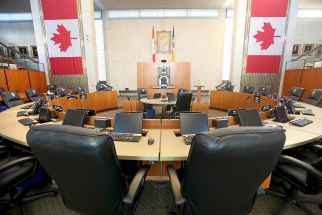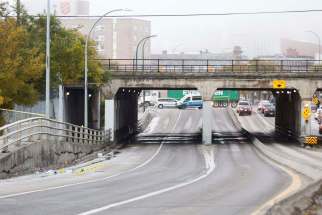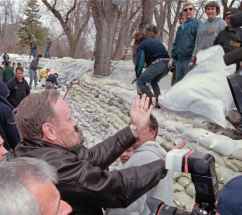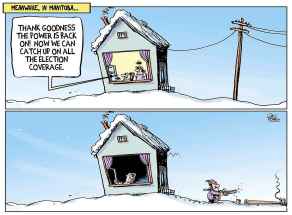Natural disasters hold special peril for politicians
Read this article for free:
or
Already have an account? Log in here »
To continue reading, please subscribe:
Monthly Digital Subscription
$0 for the first 4 weeks*
- Enjoy unlimited reading on winnipegfreepress.com
- Read the E-Edition, our digital replica newspaper
- Access News Break, our award-winning app
- Play interactive puzzles
*No charge for 4 weeks then price increases to the regular rate of $19.00 plus GST every four weeks. Offer available to new and qualified returning subscribers only. Cancel any time.
Monthly Digital Subscription
$4.75/week*
- Enjoy unlimited reading on winnipegfreepress.com
- Read the E-Edition, our digital replica newspaper
- Access News Break, our award-winning app
- Play interactive puzzles
*Billed as $19 plus GST every four weeks. Cancel any time.
To continue reading, please subscribe:
Add Free Press access to your Brandon Sun subscription for only an additional
$1 for the first 4 weeks*
*Your next subscription payment will increase by $1.00 and you will be charged $16.99 plus GST for four weeks. After four weeks, your payment will increase to $23.99 plus GST every four weeks.
Read unlimited articles for free today:
or
Already have an account? Log in here »
Hey there, time traveller!
This article was published 18/10/2019 (2242 days ago), so information in it may no longer be current.
Natural disasters of all kinds tend to function as minefields for politicians. This past week was a prime example.
Last Sunday, Conservative Leader Andrew Scheer found himself in a downtown Winnipeg hotel, surrounded by people displaced by the horrific fall snowstorm that descended on the province the previous week. Mr. Scheer and his team perhaps should have known that the hotel they had picked for a quick campaign stop would be occupied by Manitobans — many of them from Indigenous communities — who had been forced to leave their homes after widespread power failures.
A story by The Canadian Press suggested people in the hotel were frustrated and angry at Mr. Scheer for politicking and not helping them with their current plight. The story also suggested a more appropriate decision was made by NDP Leader Jagmeet Singh, who decided not to visit Winnipeg the same weekend out of fear he might be caught in a similar predicament.

One should not criticize Mr. Singh for his decision to avoid the province, but neither should we criticize Mr. Scheer for visiting Winnipeg and inadvertently wandering into a hotel that was full of people deeply affected by the far-too-early winter storm. He was not trying to use the storm or its impact on Manitobans as a backdrop for his campaign. His timing was unfortunate, but there was no politics at work in this situation.
Still, the episode serves as a reminder that natural disasters can be fraught with danger for opportunistic politicians.
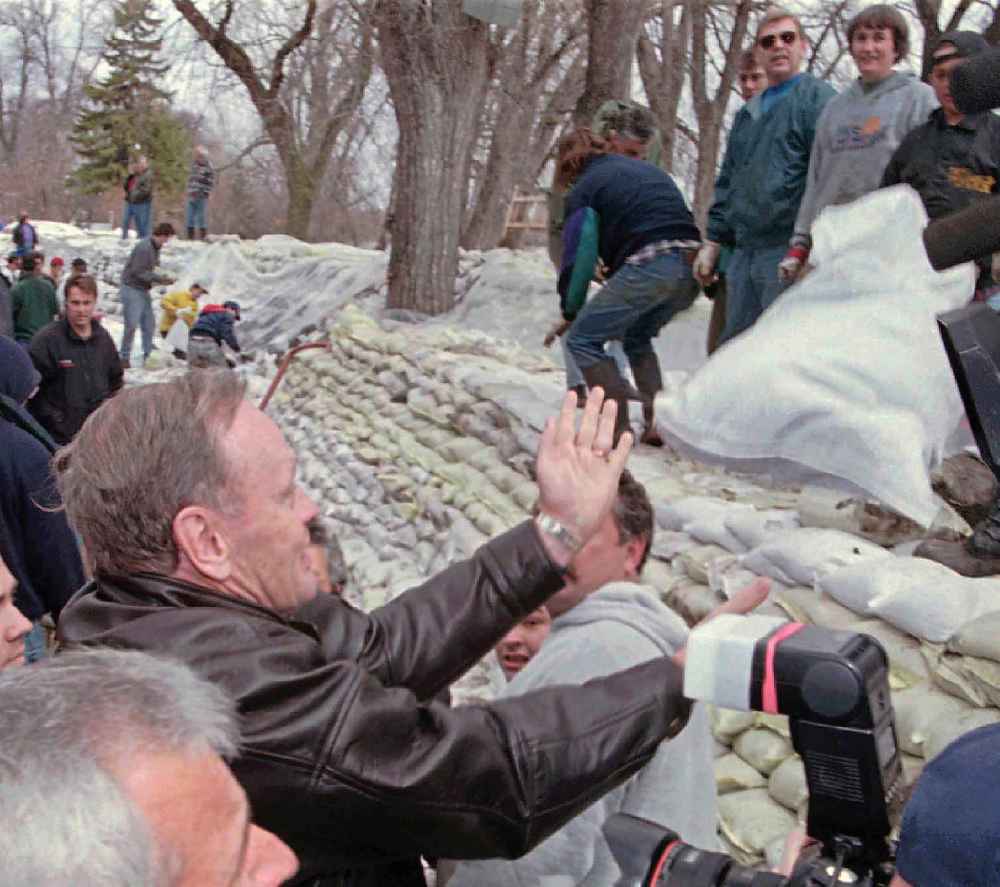
Former Liberal prime minister Jean Chrétien is perhaps the most memorable example of a political leader caught up in a natural-disaster controversy, having been roundly criticized for trying to use Manitoba’s 1997 “flood of the century” as a photo opportunity. While Mr. Chrétien was visiting the front lines of the flood battle, a volunteer handed him a sandbag, to which he famously said, “What do you want me to do with this?” Although it was likely an awkward attempt at humour, almost no one saw it as a laughing matter.
Incidents such as Mr. Chrétien’s flood-fight faux pas have encouraged political leaders to avoid natural disasters. In a way, that is unfortunate because it is during times of crisis that political leaders should show the public they are able to lead.
In 2014, then-Opposition leader Brian Pallister suggested he would not visit the front lines of a significant 2014 spring flood out of respect for the victims. As it turned out, he was actually out of the province at the time. However, what Mr. Pallister missed was that people fighting the 2014 spring flood would no doubt have appreciated having a man who aspired to be premier observe and understand exactly what they were facing.
There is a thin line between effective political leadership and cynical political opportunism, but to suggest that leaders should always stay away from natural disasters out of respect for the victims is wrong-headed. How can the people in charge of responding to natural disasters make just and fair decisions if they have not experienced extreme weather events first-hand?
Mr. Scheer was criticized for inadvertently wandering into the wreckage of Manitoba’s recent winter storm. Instead of continuing to apologize, perhaps he could use that experience to make a more deliberate effort, after the next great weather event, to show the people most affected that some political leaders really care. Photo opportunity or not, that is likely what the victims of disaster would appreciate most.





